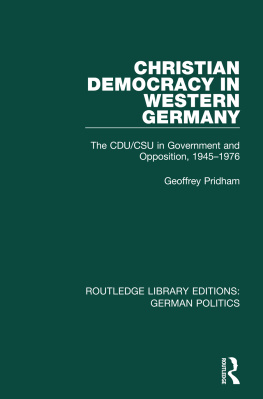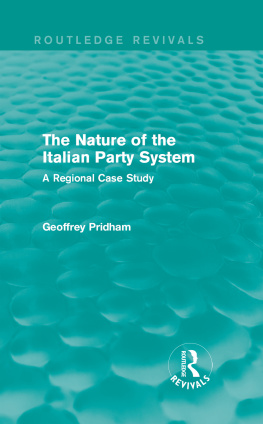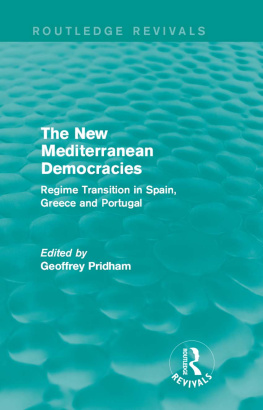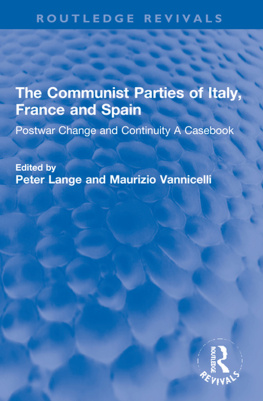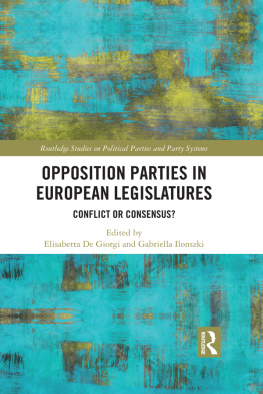Political Parties and Coalitional Behaviour in Italy
Geoffrey Pridham, Department of Politics, University of Bristol
Coalitional behaviour is central to the Italian system of government but has been largely neglected by research. As a result, coalitions in post-war Italy have been viewed as unstable, short-lived and incohesive. In this book, the author corrects this one-sidedness by analysing Italian coalition politics as a continuous and dynamic process. His comprehensive, interpretative approach takes account of other new developments in coalition studies and relates his subject both to the literature on Italian politics and to the comparative study of party systems in liberal democracies.
An introductory chapter places Italian coalitional behaviour in a theoretical and comparative context. This inductive framework is then used as a reference for examining historical, institutional, motivational, internal, socio-political and environmental dimensions of the phenomenon.
Political Parties and Coalitional Behaviour in Italy
Geoffrey Pridham
ROUTLEDGE
London and New York
First published in 1988 by
Routledge
2 Park Square, Milton Park, Abingdon, Oxon, OX14 4RN
Published in the USA by
Routledge
270 Madison Ave, New York NY 10016
Transferred to Digital Printing 2006
1988 G. Pridham
All rights reserved. No part of this book may be reprinted or reproduced or utilized in any form or by any electronic, mechanical, or other means, now known or hereafter invented, including photocopying and recording, or in any information storage or retrieval system, without permission in writing from the publishers.
British Library Cataloguing in Publication Data
Pridham, Geoffrey
Political parties and coalitional behaviour
in Italy.
1. Coalition governments Italy
2. Political parties Italy
I. Title
324.245 JN5651
ISBN 0-415-00503-5
Library of Congress Cataloging-in-Publication Data
Pridham, Geoffrey, 1942
Political parties and coalitional behaviour in Italy/Geoffrey
Pridham.
p. c.m.
Includes index.
ISBN 0-415-00503-5
1. Political parties Italy. 2. Coalition governments Italy.
3. Italy Politics and government 1945 I. Title.
JN5651.P73 1988
324.0945 dc 19 87-33285
Publisher's Note
The publisher has gone to great lengths to ensure the quality of this reprint but points out that some imperfections in the original may be apparent
TO SUE
AND
JOEL, MOTH AND MERLIN
Preface
This study is the outcome of six years' work. Research was carried out over the period 1981-5, including two longer stays based in Rome and many shorter visits between and after, and the results were written up in the following two years. One of these stays included sabbatical leave from the University of Bristol; the other coincided usefully with one of Italy's, lengthier coalition formations, that which led in 1983 to the appointment of the first Socialist prime minister.
Research on this project further benefited from previous and parallel work in the fields of both Italian politics and coalition studies. The idea for a book on the subject of Italian coalitional behaviour arose directly from an earlier project on Italian political parties in the region of Tuscany in the later 1970s. This included analysis of coalition politics at the local and regional level. The present study has to some extent drawn on work for that book, especially interviews, with some respondents being re-interviewed in the early 1980s. Additionally, interim results from the present project were presented in four successive workshops of the European Consortium for Political Research (ECPR) during 1982-6, when discussions with a variety of colleagues at home and abroad proved helpful in developing further the approach and content of this book. In particular, there was the parallel project based on the 1984 workshop at Salzburg, of which I was director, resulting in publication by The Cambridge University Press as Coalitional Behaviour in Theory and Practice: an inductive model For Western Europe (1986). The present book applies the multi-dimensional framework developed there and outlined here in .
Consequently, this study has attempted to relate the practice of Italian politics to coalition theory, and furthermore to draw lessons from the comparative study of political parties. Italy is a country that has long been known for the complex nature of its coalition politics, this tending to reinforce assumptions about the uniqueness of the political system there. Yet, although the case of Italy has often been identified as significant in coalition theory, its coalitional behaviour has been much neglected in empirical work despite the marked growth in Italian political studies in recent years. Italy is also now much more integrated into comparative politics than before, so that altogether there is good reason for relating Italy to theoretical work or at least not taking for granted the uniqueness of the former. At the same time, in line with previous publications on Italian politics, it is regarded as essential to examine the problems of the Italian state in conjunction with those of society because of the close entanglement of political, social and economic developments in postwar Italy. That certainly goes for a central question like political parties and coalitional behaviour in that country. Hence, for all these different reasons the broad approach of the multi-dimensional framework is particularly applicable to the Italian case.
The first part of this book is introductory and discusses the relevance of coalition theory, introduces the framework and explains its influence in research planning. It contains no general bibliography, but the literature on the subject of Italian coalitions is assessed separately in, while detailed references to sources are contained in the Notes for each chapter which are presented together at the end. The second, third and fourth parts of the book apply in turn the seven dimensions of the framework, these being grouped according to national politics, centre-periphery and vertical linkages in the system and the broader environment.
Research for this book would not have been possible without grants from the British Academy and also from the University of Bristol to visit Italy, The University's Publications Committee also gave some financial assistance towards the production of this book. I am otherwise in debt to very many people during the course of working on it, including those who gave generously of their time in being interviewed at length. They are all mentioned in the List of Interviews at the end. In some cases, they were re-interviewed once or twice. In particular, I would like to give special thanks among colleagues and friends in Italy to the following: Antonio Agosta, Mario Caciagli, Vittorio Gabrieli, Oreste Massari, Peter Nichols, Julian Vranek and James Walston. Among departmental colleagues at Bristol who helped with problems of research strategy I should like to mention Paul Whiteley and Martin Crouch. In the long final stage of revising and editing the work, Jean Webber contributed diligently in transforming the complexities of Italian coalitional behaviour into clear text for the reader.
Finally, these acknowledgements are hardly complete without many works of thanks to Sue, who over the years showed patience, encouragement and sometimes bewilderment at the length of the task.
Geoffrey Pridham
Bristol, August 1987
Part One
Interpreting Italian Coalitional Behaviour: The Theory and the Practice



